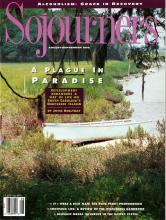Whoa. Get a Bible. First read the text. These studies merely intend to help illuminate the text. We do not want to approach spiritual insight like a fast-food restaurant. We are not trying to rip off ideas for sermons (are we?). We come as the starving.
And it is really true, after all: We are all starved for the Word of God, in a world that pummels us with words. We thirst for a transformative, insightful word in a salt-sea of information. The lectionary guides are not the text. They merely attempt to serve the text. Holy Spirit, illuminate your Word. Save us from words (even from these study guides).
If you can, call together a group of friends or kindred searchers to work through these texts in community. Pouring over the Bible with others can unleash what Michel Foucault calls an "insurrection of subjugated knowledges." It helps us to hear what we have been ordered not to hear, or to discount. It permits the text to be untamed, de-domesticated, dangerous, subversive of all our complacencies.
August 2: The Lie of Violence
2 Kings 13:14-20a; Colossians 3:1-11; Luke 12:13-21
Texts like this 2 Kings passage are an embarrassment. Where do we find the gospel in a narrative premised on the discredited notion of holy war, and chock-full of magical hocus-pocus to boot?
Read the Full Article

